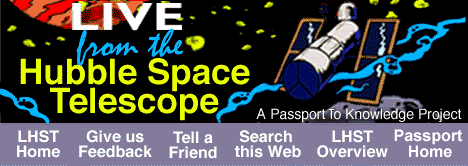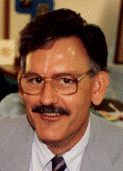


Although I have worked on many tasks to support the operations of the Hubble ground system, I am now a Contact Scientist assigned to the Goddard High Resolution Spectrograph (GHRS) team. In a nutshell, the Contact Scientist acts as the scientific liaison with astronomers proposing to use HST and as the scientific interface between the astronomer and the Program Coordinators, who will do the bulk of the work preparing the astronomers proposal for execution on board the spacecraft.
The Contact Scientist supports the astronomer from beginning to end, that is, from the time he/she is designing the proposal to reducing the data received. We begin by reading all the proposals assigned to us to learn what science the astronomer is planning to do. Then we verify the feasibility of what has been proposed; can it be done or not, and if so, does the way the astronomer describe what he/she wants to do make sense. We have to make sure the instrument is being used properly, that exposure times are adequate to acquire the object, and that the science desired is obtained accurately and efficiently.
During the initial phase of proposal preparation by the astronomer, we answer lots of questions and try to help the astronomer as much as possible. After the proposal has been completed by the astronomer and submitted to the STScI, the PC begins working on the proposal to get it transformed into the language needed by the spacecraft computers to take the data. We help resolve any problems we can during this phase and act as the astronomer's advocate if any changes are needed. We try to keep a close watch on the proposals throughout, including when proposals are scheduled for execution.
When the exposures from the proposal are completed, we then expect to help the astronomer, if necessary, in arranging trips to the Institute to reduce the data, and assist in providing the personnel or expertise to help analyze the data.
This is a lot to do. But that's not all. We also have tasks in addition to those assisting the astronomer. My primary task is as Data Quality Assessment Coordinator for the GHRS team. I am preparing procedures for other Contact Scientists and team members to use in verifying the quality of data taken by the GHRS, and to identify any problems which the astronomer would need to know about. Ultimately, information learned during this process will be archived in a database available to astronomers from around the world for years to come.
And finally, somewhere along the way, when time is available, I try to do some research on my own projects and publish papers when I can. Despite the problems of finding time for research, I have published about 40 scientific papers during my astronomical career.
I guess I've always wanted to be an astronomer. Oh, there were one or two thoughts about studying fossils or the weather, but astronomy was my greatest interest. My parents say I used to go out into the backyard with my star charts and flashlight and spend hours looking at the stars. What I do remember is that I decided I was going to become an astronomer when I was about 7 years old.
As a kid, my parents saw to it that I was able to get the basic astronomy books and guides appropriate to my age at the time. When I entered high school, I took the college preparatory courses. I went to a small school in the desert of Southern California near the Salton Sea. There were only 52 students in my high school graduating class. Even though an astronomy course wasn't available, the physics teacher did let us drag out the 12-in reflector telescope for viewing in the evenings. I never had a telescope of my own, partly because they were expensive, and partly because I was able to borrow the 4-in refractor from the school or use the 12-in.
Of course, when I got to college, everything was geared toward getting a degree in astronomy. I started out at the local Junior College where I got my AA degree, then transferred to San Diego State University, where I got both my Bachelor of Science and Masters Degree. I took a leave of absence for two years to work at Mt. Wilson and Palomar Observatories with Allan Sandage on a project to support the Uhuru X-ray satellite, then returned to SDSU to finish my degree, do a little teaching, and lots of research.
After graduating, I got a job a Mt. Wilson Observatory operating the 60-in and 100-in telescopes and eventually doubled as an observer. I also did a lot of observing on my own projects which the observatory supported, observing as much as 60-80 nights per year. While at Mt. Wilson, I also wrote bi-weekly astronomy articles for my home town newspaper, and served as a Trustee and Chairman of several committees of the Mt. Wilson Observatory Association. I stayed at Mt. Wilson for 10 years, and would have stayed longer but they closed it down. That's when I got the job with Computer Sciences Corporation working with the real-time support and planning and scheduling (SPSS)for the Hubble Space Telescope.
I was one of the first hired as a Science Operations Specialist in 1985, when we thought we were only one year from launch. A year later, the Space Shuttle Challenger blew up. None of us knew what would happen, but we stuck with it preparing our procedures and training for the 'real thing'. I became an Operations Astronomer in 1990 and lead for the Proposal Preparation Section and Transformation software Task Leader for SPSS. Now I am a Contact Scientist with the GHRS team.
Lots of things have changed since I was in school and I would probably advise a budding astronomer to do it a bit differently now. I don't think it's necessary to get a Bachelor's degree in astronomy. In fact, it would be better to major in physics, getting a good foundation in the basics first, and perhaps minor in mathematics or computer sciences. If possible, I would even advise the student to take electronic design and shop classes. One thing I discovered while at Mt. Wilson Observatory was that many of the Cal Tech students designed and built their own equipment for doing research in astronomy. That shop experience would have been very valuable for me. Just knowing astronomy and what it's all about isn't really enough any more. You also need to know how to do it, or devise ways of doing it better. Today, a big part of the job of supporting astronomy includes the scientific knowledge as well as experience with computers, data analysis, and instrument design.
Over the years I've had several people who influenced me to reach my goal of becoming an astronomer. My parents were, of course, the first. Ever since I showed an interest, they provided constant encouragement, and never let me get too 'down' when things weren't going that well. I always had difficulty reading due to problems with my eyes, so they read to me when my eyes would get tired and I couldn't read any more myself. My eyes are ok now, but I wasn't going to let that problem stop me. My parents were there to help me through college too. I soon got to the point they couldn't help with my course work or research, but they continued to help with apartments, school expenses, and words of encouragement.
In high school, my math and physics teachers, Mr. Archbold and Mr. Caswell, constantly pushed me to do better. When I would go home I would also try to go see them. Mr. Caswell has passed on, but I still try to go see Mr. Archbold since we have remained friends for over 30 years. During my college years, the chairman of the astronomy department at San Diego State University, Burt Nelson, was perhaps the most influential in my early years of learning to do real observational astronomy. And later, Allan Sandage became a great influence in my career.
I am married and have one son. My wife works right across the street at Johns Hopkins University and is taking classes there to finish her college degree. I am taking classes again too with an emphasis in computer sciences. Things change. You have to keep up and learn new things. My son is now working for a computer company out in Arizona after having spent several years in the army.
My father and mother are retired now. Although my father didn't have the opportunity to get much schooling, he was able to learn a lot in his life. He has done all sorts of amazing things, including working as a cowboy hearding cattle, a reserve deputy sheriff, farming, building houses, serving as a member of the city planning commision, and as Superintendent of Maintenance and Grounds for the local school district.
After working for the railroad and farming with my dad, my mother began working as a teacher of 1st and 2nd grade, then taught Spanish and English as a Second Language for 6th graders, and eventually became the Principal of the Elementary school. At retirement, she even had the credentials to become Superintendent of the School District. She has also been very active as choir director and organist for the Community Church for more than 40 years.
When my wife and I are not in school or working, we like to go antiquing. You find all kinds of interesting things, even some of the things I used to see or use when I was a kid. But I'm not an antique, not yet anyway.

![]()